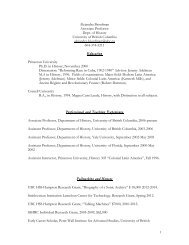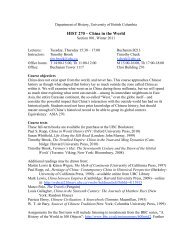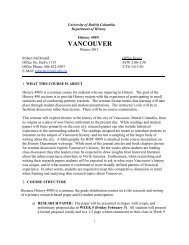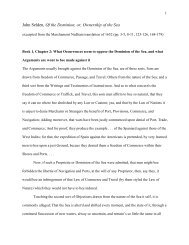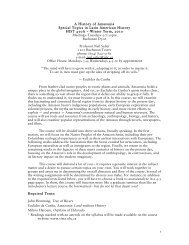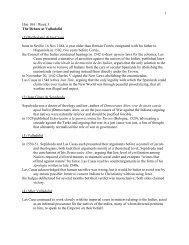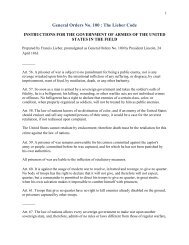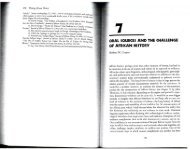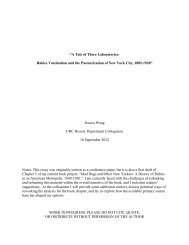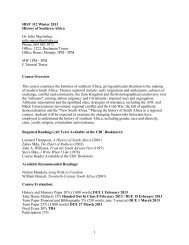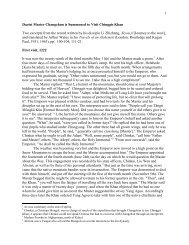Orientalizing the Pacific Rim: - History, Department of
Orientalizing the Pacific Rim: - History, Department of
Orientalizing the Pacific Rim: - History, Department of
You also want an ePaper? Increase the reach of your titles
YUMPU automatically turns print PDFs into web optimized ePapers that Google loves.
<strong>the</strong> former Stanford University pr<strong>of</strong>essor and prominent Progressive Party intellectual<br />
who had advocated an instrumental role for social science in <strong>the</strong> control and progress <strong>of</strong><br />
society. 27 Ross and many <strong>of</strong> his contemporaries pioneered a vision <strong>of</strong> social science<br />
which shared a tenet with <strong>the</strong> missions <strong>of</strong> <strong>the</strong> Protestant ministers--social reform<br />
planned and implemented by highly educated elites. 28 Indeed, many <strong>of</strong> <strong>the</strong> early<br />
27 Ross, who had written Social Control (New York: Macmillan, 1901), extolled <strong>the</strong><br />
power <strong>of</strong> social science in <strong>the</strong> aid <strong>of</strong> planned social reform. He was also one <strong>of</strong> <strong>the</strong><br />
sociologists with <strong>the</strong> most hierarchical conceptions <strong>of</strong> race. For <strong>the</strong> rise <strong>of</strong> sociology as a<br />
discipline, see Mary Furner, Advocacy and Objectivity: A Crisis in <strong>the</strong> Pr<strong>of</strong>essionalization <strong>of</strong><br />
American Social Science, 1865-1905 (Lexington: University Press <strong>of</strong> Kentucky, 1975); and<br />
Dorothy Ross, The Origins <strong>of</strong> American Social Science (Cambridge: Cambridge<br />
University Press, 1991). In a ra<strong>the</strong>r complicated book, one <strong>of</strong> <strong>the</strong> myriad things Ross<br />
does is to place <strong>the</strong> rise <strong>of</strong> social science in <strong>the</strong> United States within <strong>the</strong> context <strong>of</strong> a<br />
language <strong>of</strong> ‘American exceptionalism,’ <strong>the</strong> end achievement being <strong>the</strong><br />
transformation by Park’s Chicago school <strong>of</strong> <strong>the</strong> idea <strong>of</strong> America as a ‘melting pot’ into<br />
<strong>the</strong> ‘objective,’ ‘natural process’ <strong>of</strong> <strong>the</strong> ‘assimilation cycle.’<br />
28 The ‘enlightenment project’ <strong>of</strong> American social reformers at <strong>the</strong> turn <strong>of</strong> <strong>the</strong> century<br />
owed much to <strong>the</strong> European Enlightenment which spawned <strong>the</strong> notion <strong>of</strong> social science,<br />
but its alliance with organized religion differed markedly from <strong>the</strong> ‘enlightenment’ <strong>of</strong><br />
Voltaire and Denis Diderot. The American social scientists scoured <strong>the</strong> European<br />
traditions for antecedents to <strong>the</strong>ir fledgling social science, and found <strong>the</strong> most<br />
conducive ‘fa<strong>the</strong>r figures’ in <strong>the</strong> Scottish Enlightenment (Adam Smith and Adam<br />
Ferguson), who were much less anti-clerical than <strong>the</strong> French philosophes. For a<br />
canonical discussion <strong>of</strong> <strong>the</strong> rise <strong>of</strong> <strong>the</strong> ‘science <strong>of</strong> human society,’ see Peter Gay, The<br />
Enlightenment: An Interpretation, Volume II: The Science <strong>of</strong> Freedom (New York: Vintage,<br />
1969). It is interesting to contrast Gay’s reading <strong>of</strong> <strong>the</strong> European Enlightenment with<br />
20



